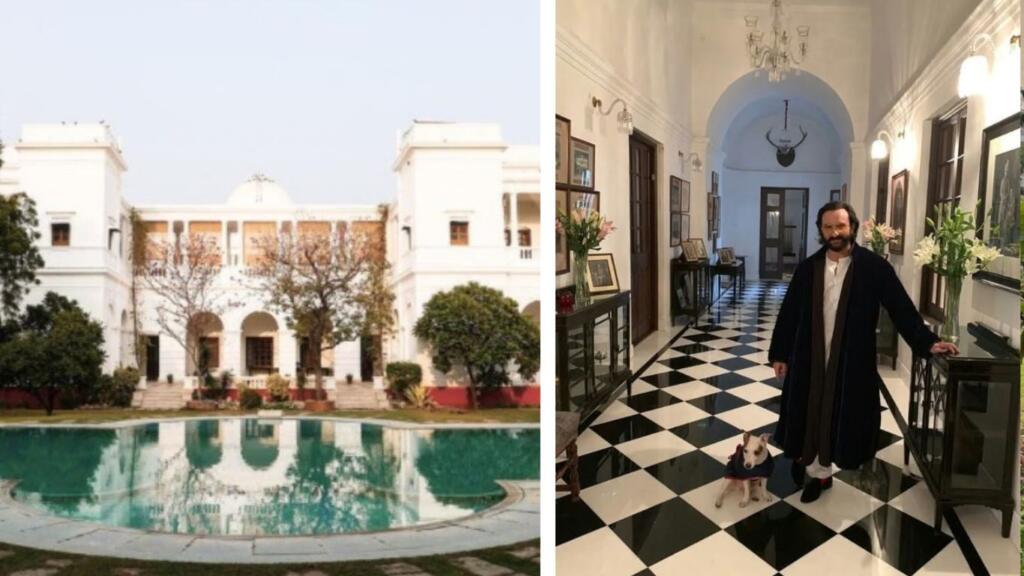Bollywood actor Saif Ali Khan’s troubles are showing no sign of ending. After being stabbed and attacked in his own house, now he is entangled in a legal dispute involving ancestral properties of the Pataudi family in Bhopal. The estimated worth of the property is ₹15,000 crore. The Madhya Pradesh High Court’s recent ruling dismissed his plea to prevent the government from declaring these properties as “enemy property.” This decision brings the matter closer to a government takeover under the Enemy Property Act, of 1968, sparking significant public and legal interest.
The properties under contention include important and famous landmarks such as the Noor-Us-Sabah Palace, Flag Staff House, Dar-Us-Salam, and other estates in Bhopal. The dispute revolves around the Nawab of Bhopal’s descendants and ownership claims arising from historical migration during the Partition.
What the Court Said?
The Madhya Pradesh High Court, in its December 13, 2024, ruling, lifted a stay imposed in 2015, potentially clearing the path for government acquisition of these properties. Justice Vivek Agarwal directed the parties to file a representation before the appellate authority within 30 days.
He emphasised that the appeal would be considered without limitations. The court also acknowledged the complex nature of the case. The court provided a statutory remedy under the amended Enemy Property Act, of 2017.
The decision will also impact residents living on these lands, many of whom fear eviction or reclassification as tenants. The local administration, under the Bhopal collector Kaushalendra Vikram Singh, has begun examining ownership records of Pataudis over the last 72 years. The administration also plans to survey the properties to clarify legal standings.
Why the Properties May Be Seized
The government’s claim stems from the migration of Abida Sultan, the eldest daughter of the last Nawab of Bhopal, Hamidullah Khan, to Pakistan in 1950. Under the Enemy Property Act, properties owned by individuals who moved to Pakistan after Partition can be taken over by the government.
Although Saif Ali Khan’s grandmother, Sajida Sultan, stayed in India and was legally recognized as the heir in 2019. However, the government argues that Abida Sultan’s migration qualifies the properties as enemy property. Despite previous court rulings in favour of the Pataudi family, this contention has reignited the dispute.
Understanding the Enemy Property Act, 1968
The Enemy Property Act was enacted after the 1965 India-Pakistan war. It allows the central government to seize properties belonging to individuals who acquired Pakistani citizenship. The law defines such assets as “enemy properties” and places them under the Custodian of Enemy Property, a department responsible for their management.
In 2017, the Act was amended to strengthen government control. The amendments ensured that enemy property could not be transferred by sale or inheritance. It also gave the government retrospective authority to declare properties as enemy property, irrespective of past ownership claims or legal verdicts.
Family Background and origin of the legal dispute
The Pataudi family, to which Saif Ali Khan belongs, claims that they have a historical links to the princely state of Bhopal and the royal lineage of Pataudi.
The last Nawab of Bhopal, Hamidullah Khan, was the patriarch of this family. He had three daughters: Abida Sultan, Sajida Sultan, and Rabia Sultan. Hamidullah Khan ruled Bhopal until India’s independence in 1947. His family’s prominence and wealth stemmed from Bhopal’s status as one of the largest princely states in central India, known for its extensive estates, palaces, and cultural influence.
Also Read: Saif Ali Khan strolls out of Lilavati Hospital, netizens question miraculous recovery
After the Partition of India in 1947, the political and familial dynamics of the Nawab’s descendants underwent a dramatic shift. The eldest daughter, Abida Sultan, chose to migrate to Pakistan in 1950, renouncing her Indian citizenship. This decision profoundly impacted the family’s legacy, as it introduced the complexities of inheritance and citizenship in a divided subcontinent.
The second daughter, Sajida Sultan, stayed in India and became the rightful heir to her father’s estates under Indian law. She married Nawab Iftikhar Ali Khan Pataudi, a renowned cricketer and the Nawab of Pataudi, a princely state in present-day Haryana. Their marriage connected the royal families of Bhopal and Pataudi, creating a lineage steeped in tradition.
Sajida Sultan and Nawab Iftikhar Ali Khan Pataudi had three children, including Mansoor Ali Khan Pataudi, a cricketer and the former captain of the Indian cricket team. Mansoor married Bollywood actress Sharmila Tagore. Their son, Saif Ali Khan, inherited the legacy of both Pataudis and Bhopals Nawabs.
